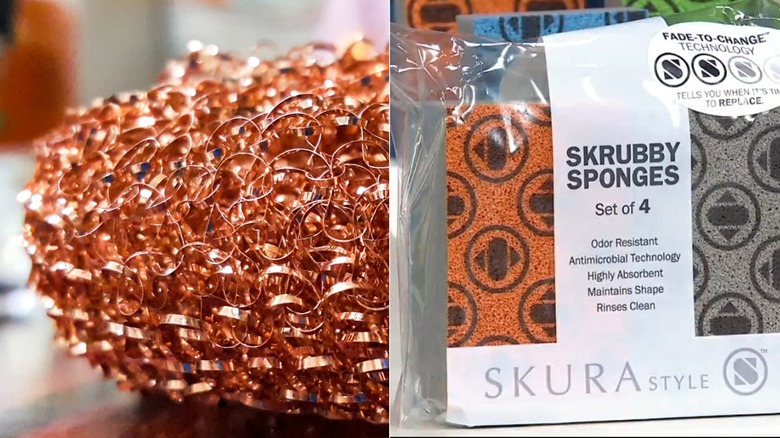For A More Bacteria-Resistant Kitchen Sponge, These Are The Materials You Should Look For
We may receive a commission on purchases made from links.
It happens to a lot of us; you go to grab your kitchen sponge to wipe down your countertops after dinner, and it stinks. No, not the act of cleaning the counters, the sponge itself. It smells like a dirty shoe after a jog, and on top of that, it feels slimy. It's not your fault — the kitchen sponge is one of the dirtiest things in the home. Maybe you've tried storing it on a well-ventilated tray, sanitizing it in the dishwasher, or even using the microwave trick, but nothing works for long. The problem is that sponges are bacteria factories by their very nature. The sponge's pores trap food debris, stay moist for long periods, and dry slowly at room temperature. These factors are what make the common kitchen sponge the perfect environment for bacterial growth. So, what's the solution? You need a sponge made of antibacterial materials.
The average kitchen sponge is made from polyurethane or, if you're more eco-conscious, cellulose. Both materials can harbor bacteria and are not antibacterial by nature. This is why, after a while, your sponge can start to smell and get slimy. Another contributor to bacterial growth on sponges is that they are rarely used for one purpose. We use them to wipe down countertops, refrigerators, and microwaves, then use them to wash dishes. Using a sponge on multiple surfaces creates even more opportunity for bacteria to spread and accumulate in your sponge. Thankfully, modern innovations have produced several great alternatives — including some eco-friendly options.
The best sponges for preventing the spread of bacteria
If you want an alternative to your sponge that has antibacterial properties, something like a Skura Style Scrub Pad is a great option. These sponges are treated with an antibacterial agent called Polysept, which helps prevent bacteria-causing microbes from developing. According to the company, this treatment helps keep the sponge bacteria resistant and prevents odors and germ spread.
If you don't like the idea of chemical additives in your sponges, you can opt for a sponge infused with metal elements that are naturally antibacterial. Look for sponges that contain silver ions, copper, or zinc pyrithione. These metals have been known to prevent bacterial growth for a very long time and will prevent stinky sponge syndrome. These options can help keep your kitchen cleaner and reduce germ exposure for your household.
No matter which type you choose, it's still important to store sponges so they dry quickly and to replace them regularly. It's also a great idea to designate a single sponge for a specific purpose; this will reduce cross-contamination. You'll be so glad when you no longer have to use a kitchen sponge that smells like a dirty shoe.

